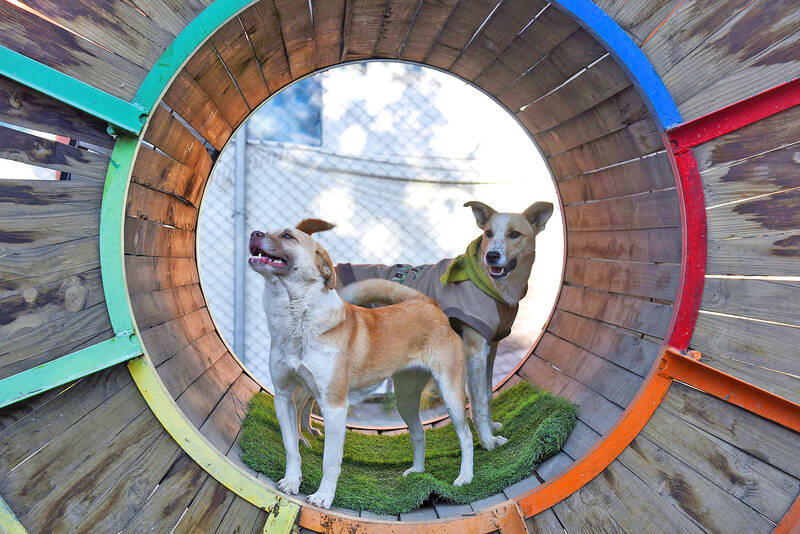The ability of dogs to sniff out stress levels in humans has been known for some time.
But the relationship between woman and man’s four-legged best friend is two-way, and scientists now believe they have discovered that when a dog senses a person in distress, it has a knock-on effect in the behavior of the animal — most notably, it makes them pessimistic.
New research is believed to be the first to test how dog owners’ emotional states can affect their pets.

Photo: Reuters
Nicola Rooney, senior lecturer at the University of Bristol’s veterinary school and lead author of a paper on the subject, said: “Dog owners know how attuned their pets are to their emotions but here we show that even the odor of a stressed, unfamiliar human affects a dog’s emotional state, perception of rewards and ability to learn.
“Working dog handlers often describe stress traveling down the lead, but we’ve also shown it can also travel through the air.”
She added that understanding how human stress affects dogs’ wellbeing was important for dogs in kennels and training companion, working and assistance dogs.

Photo: AFP
The team used a test of “optimism” or “pessimism” in animals to determine whether they were feeling positive or negative emotions after exposure to people’s stressed and relaxed odors.
The researchers recruited 18 dog-owner partnerships to take part in trials in which dogs were trained that when a food bowl was placed in one location it contained a treat but when placed in another location it was empty.
Once dogs learned the difference between these bowl locations, they were faster to approach the location with a treat than the empty location. Researchers then tested how quickly the dog would approach new, ambiguous bowl locations positioned between the original two.

Photo: EPA-EFE
A quick approach reflected optimism about food being present in these ambiguous locations — a marker of a positive emotional state — while a slow approach indicated pessimism and negative emotion. These trials were repeated while each dog was exposed to either no odor or the odors of sweat and breath samples from humans who were feeling stressed from a math test or relaxed after listening to soundscapes.
Researchers discovered that the stress smell made dogs slower to approach the ambiguous bowl location nearest where they had been trained to expect empty bowls. This effect that was not replicated after exposure to the relaxed smell.
These findings suggest that the stress smell may have increased the dogs’ expectations that this new location contained no food, similar to the nearby empty bowl location. The researchers suggested this could be a way for the dog to conserve energy and avoid disappointment.
The team also found that dogs continued to improve their learning about the presence or absence of food in the two trained bowl locations and that they learned the difference faster when the stress smell was present.

May 18 to May 24 Pastor Yang Hsu’s (楊煦) congregation was shocked upon seeing the land he chose to build his orphanage. It was surrounded by mountains on three sides, and the only way to access it was to cross a river by foot. The soil was poor due to runoff, and large rocks strewn across the plot prevented much from growing. In addition, there was no running water or electricity. But it was all Yang could afford. He and his Indigenous Atayal wife Lin Feng-ying (林鳳英) had already been caring for 24 orphans in their home, and they were in

On May 2, Chinese Nationalist Party (KMT) Chairman Eric Chu (朱立倫), at a meeting in support of Taipei city councilors at party headquarters, compared President William Lai (賴清德) to Hitler. Chu claimed that unlike any other democracy worldwide in history, no other leader was rooting out opposing parties like Lai and the Democratic Progressive Party (DPP). That his statements are wildly inaccurate was not the point. It was a rallying cry, not a history lesson. This was intentional to provoke the international diplomatic community into a response, which was promptly provided. Both the German and Israeli offices issued statements on Facebook

Even by the standards of Ukraine’s International Legion, which comprises volunteers from over 55 countries, Han has an unusual backstory. Born in Taichung, he grew up in Costa Rica — then one of Taiwan’s diplomatic allies — where a relative worked for the embassy. After attending an American international high school in San Jose, Costa Rica’s capital, Han — who prefers to use only his given name for OPSEC (operations security) reasons — moved to the US in his teens. He attended Penn State University before returning to Taiwan to work in the semiconductor industry in Kaohsiung, where he

Australia’s ABC last week published a piece on the recall campaign. The article emphasized the divisions in Taiwanese society and blamed the recall for worsening them. It quotes a supporter of the Taiwan People’s Party (TPP) as saying “I’m 43 years old, born and raised here, and I’ve never seen the country this divided in my entire life.” Apparently, as an adult, she slept through the post-election violence in 2000 and 2004 by the Chinese Nationalist Party (KMT), the veiled coup threats by the military when Chen Shui-bian (陳水扁) became president, the 2006 Red Shirt protests against him ginned up by